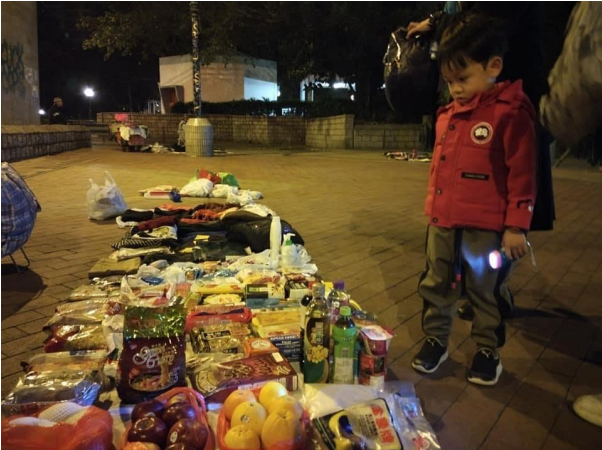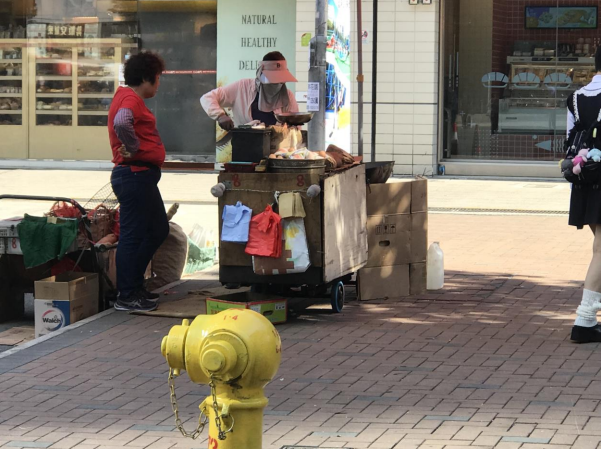1. Introduction
Hong Kong is one of the most populated cities in Hong Kong, with a population density of 6,740 people per square kilometre in 2022 (CSD, 2023). With its high flexibility and mobility, itinerant hawkers have played a crucial role in the local economy for patrons to buy necessaries. They are usually found on the streets with high pedestrian flow, such as urban areas and new towns in New Territories. However, during the 1970s, Itinerant Hawker Licences were issued, when the succession and transfer of licences were banned. The number of hawker licences has dropped drastically from 1,147 in 2000 to 295 in March 2023 (FEHD, 2023). Under this observation, the project aims to investigate the conflict of space between hawkers and different stakeholders, under the cultural geographical perspective of power relations.
2. Cultural Geographical Perspective in Use
With the possible conflict between different cultural groups mentioned above, we would like to introduce one of the cultural geography perspectives – power relations, to show how the power relations shape the conflict of public spaces between hawkers and the government. According to the analysis of power relations mentioned by Foucault, “when there is power, there is resistance” (Mathias, 2014). Power is not solely held by a particular group or institutions but dispersed throughout the society. Resistance is not a single act, but a continuous process emerges from power structures. The power-resistance theory allows the forced group to resist and challenge oppressive power authority.
Applying this study, the hawkers have created their spaces in public areas, to meet the commercial needs of the citizens and maximise their profits. The mobility of the hawkers allows them to extend their power to other public spaces. On the other hand, the government has imposed strict restrictions on the hawkers, such as the issuing system and overwhelming law enforcement, which limits the locations and period for hawkers to reach potential customers. Moreover, the nearby shops and residents may not allow hawking activities near the buildings, as they conflict with the current usage of the buildings. How do these stakeholders define the usage of public space? As the space is very limited in Hong Kong, especially in densely populated areas, how does the power relations between different stakeholders form the conflict of space between them, and shape the space of hawkers? This will be our focus of the analysis.
3. Empirical Analysis
Dominating power and hegemony
In hawker culture, power relationships are complex and encompass various factors, including the government's legal authority, social norms, and social recognition. Legal authority plays a significant role as dominating power in this context as it establishes rules and regulations governing the behaviour and operations of hawkers while providing the government with tools for management and oversight. The influence of legal authority extends to aspects such as the range of hawker activities, the allocation of stall locations, and the granting of operating permits.
Over the years, the authorities have implemented policies aimed at effectively regulating licensed hawker activities and taking law enforcement actions against unauthorised vending. (2023, September 14) We can see the following from the website of the Food and Environmental Hygiene Department of Hong Kong. Starting from the early 1970s, the issuance of new hawker licences has largely ceased. However, following a review of hawker licensing policies in 2009, the Director of Food and Environmental Hygiene authorised the issuance of 61 new licences for mobile (frozen dessert) hawkers and 218 new licences for fixed stalls (other categories) between July 2009 and April 2012. Under the current hawker policy, licences for fixed stalls can only be "inherited" or "transferred," and there are no plans to issue new licences for mobile hawkers (FHED, 2022). Consequently, the number of hawkers is expected to continue declining.
Cultural hegemony refers to the dominance of one cultural group over others through coercion, regulation, or the tacit acceptance of society. In managing and regulating hawkers, the government employs legal frameworks and institutional mechanisms. However, there are instances where the government excessively emphasises its authority and control while overlooking the rights and participation of hawkers. In some cases, there may even be instances of the government abusing its power to suppress hawkers, indicative of the presence of hegemonic practices.
Government’s actions towards itinerant hawkers
Comprehensive measures were adopted to crack down on the space of the itinerant hawkers. Besides hard measures including law enforcement and banned licence issuance, soft measures are used to incentivize surrendering their licences. The government is targeting to integrate itinerant hawkers into the city’s formal economy, incenting them to become hawkers in a fixed pitch like operating in a stall in the government’s wet markets and a stall with a fixed location on the street (HK01, 2023). However, the action in disguise is forcing the itinerary hawkers to pay unaffordable rent and run the business as normal merchants, altering the original traces and business practices.
Since the end of the COVID-19 pandemic, the Hong Kong government has been seeking to stimulate the economy and boost consumer spending. On September 14, 2023, they launched "Hong Kong Night Delights," a research initiative aimed at promoting the nighttime economy through night markets. However, the government has yet to introduce a new plan for issuing licences to itinerant hawkers, and the number of compliant vendors has been dwindling due to their ageing population. While the government's initiative is commendable in theory, it has failed to truly address the concerns that would benefit the itinerant hawkers, making it difficult to satisfy the needs of different cultural groups.
Resistance of the itinerary hawkers
Power is not unidimensional, and the government will meet resistance and challenge when it is exercising executive and legal power. In the case of itinerary hawkers, they have no access to the dominant power, and they adopt different measures to navigate the power dynamics.

“Dawn Markets” in Sham Shui Po (Source: HK01)
For example, they may grasp the patterns of inspection carried out by the officers from the Food and Environment Hygiene Department. Hawkers will take advantage of the dawn when the officers have not begun their patrols. They set up the famous “dawn markets”, which normally operate from 5-8 am to evade the officers. These markets are very prevalent in poorer districts around Hong Kong, as grassroots bought daily necessities with a cheap price before going to work. Meanwhile, they have established some sort of unspoken rules with the officers, who will not enforce the law on special occasions such as public holidays (Initium Media, 2016).
Meanwhile, hawkers endeavour for their legal status. Despite having little access to political power, they can leverage their economic and cultural power to navigate and challenge the dominant power held by the government.
Economically, hawkers provide affordable options for the grassroots to buy their daily goods. Many grassroots and retirees also rely on hawking for extra income. Hong Kongers viewed street vendors as a cultural emblem of the city, which adds diversity to the otherwise monotonous and unitary communities. Their economic significance and cultural value surges, as the government wishes to revitalise the night economy, and to emphasise on the cultural uniqueness of the city to attract tourists (HK01, 2023).
Their efforts have made progress in some sense, as local newspapers and lawmakers begin to advocate for reissuing licences for street vendors (HK01, 2023).

Legal Itinerary hawkers outside Shek Mun MTR Station (Source: Self-taken Photo)
4. Conclusion
To strive under the dominating power of government’s legal authority, the itinerant hawkers employ various strategies to navigate power dynamics. The resistance from the vendors demonstrates their resilience and unrelenting spirit to fight for their spaces despite facing harsh measures and regulations. As its economic and cultural values, hawkers are one of the unique cultural symbols in Hong Kong. As the new initiative to promote and restore the city’s economy in the post-COVID era, in the near future, we may see the hawker’s legal status, being forced and vulnerable in a few decades, may start to change at the same time.
References
Census and Statistics Department (CSD) (2023). Hong Kong in Figures, 2023 Edition.
FHED (2022). Hawker Control. Food and Environmental Hygiene Department. https://www.fehd.gov.hk/english/pleasant_environment/hawker/overview.html
HK01 (2023, June 19). 小販之苦·下|從公共空間到城市想像 香港連小販都容不 下嗎? 香港01 。 https://www.hk01.com/article/904686?utm_source=01articlecopy&utm_medium=referral
HK01 (2023, August 28). 香港仔天光墟商戶收告票停業 業界:象徵漁港文化吸引遊客應保留。香港01。 https://www.hk01.com/article/932281?utm_source=01articlecopy&utm_medium=referral
HK01 (2023, May 17). 來稿|打造小販經濟提升治理溫度 還給香港多些煙火氣。 香港01。 https://www.hk01.com/article/898882?utm_source=01articlecopy&utm_medium=referral
HK01 (2023, September 14). 固定小販攤檔20年減逾2千檔,呢區剩最多,有類攤販 只剩5檔恐絕跡。 香港01。 https://www.hk01.com/article/938565?utm_source=01articlecopy&utm_medium=referral
Hong Kong Special Administrative Region, Press Release. (2023). LCQ18: Preservation of the characteristics of the hawking culture. https://www.info.gov.hk/gia/general/202304/26/P2023042600216p.htm#:~:text=1%20 %281%29%20As%20at%20March%2031%2C%202023%2C%20the
Initium Media (2021, January 5). 旺角騷亂後,30年小販黃老太述說她與 香港的魚蛋夢。端傳媒 Initium Media. https://theinitium.com/article/20160220- hongkong-hkvendors
Mathias K. S. (2014). Foucault on Power Relations, Irénées. https://www.irenees.net/bdf_fiche-notions-242_en.html


